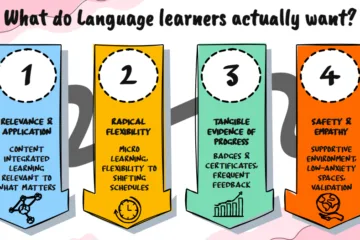European market expansion offers tremendous opportunities for growing businesses, but success requires understanding which language capabilities your sales team genuinely needs for different markets. Not all languages deserve equal investment, and different markets require distinct communication approaches that influence optimal training priorities.
The strategic language selection
European markets speak diverse languages with varying business importance and learning difficulty for English speakers. Strategic language selection based on market priorities, business objectives, and resource availability prevents wasted training investments on languages that won’t deliver proportional business returns.
German, French, Spanish, and Italian represent European languages offering strong business cases for most companies due to market sizes, economic importance, and reasonable learning accessibility. However, your optimal language priorities depend entirely on specific market targeting, existing client relationships, and strategic expansion plans.
The German market opportunity
Germany represents Europe’s largest economy and manufacturing powerhouse, making German valuable for businesses in industrial, automotive, engineering, and B2B sectors. However, German business culture values directness, punctuality, and technical precision that influence communication priorities beyond basic language learning.
Sales teams targeting German markets need vocabulary emphasising technical specifications, quality standards, and precise commercial terms. German clients expect detailed product knowledge and thorough responses to technical questions that require specialised vocabulary beyond conversational capabilities.
The French market nuances
French markets value relationship building, cultural sophistication, and communication elegance that influence language training priorities. Sales success in France depends partly on demonstrating cultural respect through proper French usage and understanding business etiquette that differs from Anglo-American norms.
Teams approaching French markets benefit from language training emphasising relationship-building conversation, business courtesy, and communication formality appropriate for French professional contexts. French clients notice and appreciate proper language usage that signals cultural sophistication and market commitment.
The Spanish market diversity
Spanish markets extend across Spain and Latin America, creating language training opportunities with broad geographical reach. However, Spanish business culture emphasises relationship warmth, personal connection, and communication styles valuing rapport building over purely transactional interactions.
Sales teams need Spanish capabilities emphasising conversational flexibility, relationship-building language, and communication approaches that create personal connections. Spanish clients prefer suppliers who engage warmly and build genuine relationships beyond purely commercial discussions.
The Italian market characteristics
Italian markets reward relationship building, cultural understanding, and communication demonstrating genuine interest in Italian business culture and regional differences. Italian business operates through networks and relationships that require patient development through consistent engagement.
Language training for Italian markets should emphasise conversational capabilities, relationship-building vocabulary, and cultural knowledge about regional business variations throughout Italy. Italian clients value suppliers who invest time building authentic relationships rather than rushing commercial discussions.
The sales conversation priorities
Sales teams don’t need literary fluency or academic language mastery. They need practical business communication capabilities for client interactions, presentations, negotiations, and relationship building that directly support sales objectives.
Language courses designed for sales applications should focus on client meeting language, presentation vocabulary, negotiation terms, and relationship-building conversation rather than comprehensive language mastery. This targeted approach accelerates useful capability development whilst avoiding time spent on irrelevant academic content.
The presentation skills focus
European business development often requires formal presentations to clients, partners, or prospects. Presentation capabilities in target languages represent high-priority skills that influence client perceptions about your company’s professionalism and international competence.
Corporate training should emphasise presentation language, persuasive communication, and professional delivery skills in target languages. These capabilities enable confident client presentations that build credibility whilst demonstrating market commitment that generic English presentations cannot match.
The negotiation language importance
Commercial negotiations require specialised vocabulary around pricing, terms, conditions, and contractual elements that differ substantially from general conversation. Sales teams need negotiation-specific language training that enables confident commercial discussions.
Business language courses addressing negotiation situations teach terminology for discussing terms, handling objections, proposing alternatives, and reaching agreements. This specialised focus produces practical capabilities for actual sales scenarios rather than general conversation that may not transfer effectively to negotiation contexts.
The cultural protocol understanding
European markets maintain varied business etiquette around meetings, communications, relationship development, and commercial practices. Understanding these protocols prevents mistakes that damage relationships whilst demonstrating cultural sophistication that clients appreciate.
Language training incorporating cultural business protocols prepares sales teams for appropriate behaviour beyond just communication competence. Understanding when formality matters, how decision-making occurs, and which relationship-building approaches work effectively influences sales success substantially.
The email and written communication
European business relationships increasingly involve email communications, written proposals, and digital interactions requiring clear written language capabilities alongside verbal skills. Sales teams need written communication training that enables professional email exchanges and document creation.
Language classes should address business writing, email communication, proposal language, and professional correspondence that sales processes require. Written capabilities complement verbal skills by enabling complete communication competence across all business interaction modes.
The timeline and progression
Sales language capabilities develop progressively, with initial training producing basic client interaction abilities that improve through continued practice and advanced instruction. Understanding realistic progression timelines prevents disappointment whilst enabling appropriate planning for market entry timing.
Most sales teams achieve useful client interaction capabilities within six months of consistent language training, with continued improvement enabling more sophisticated negotiations and complex discussions over subsequent periods. This progressive development enables phased market entry that begins with basic capabilities whilst teams continue developing advanced competencies.
The translation service complement
Whilst sales teams develop language capabilities, businesses still need professional translation for marketing materials, product documentation, proposals, and written content requiring native-speaker quality. Translation services complement training by handling content needs during capability development periods.
At The Chat Laboratory, our language courses focus on practical business communication for sales applications, emphasising client interactions, presentations, and negotiations rather than academic language mastery. This targeted approach produces sales-useful capabilities efficiently.
We also provide professional translation services for marketing materials, proposals, and business documents that support sales activities in target markets. Our native speaker translators ensure your written materials meet professional standards whilst your sales team develops verbal communication capabilities.
The comprehensive market preparation
Successful European market entry requires both professional content through translation services and team communication capabilities through language training. Understanding which capabilities matter most for specific markets enables strategic resource allocation that supports effective market development.
Sales teams prepared through appropriate language training combined with professionally translated marketing materials and business documents create comprehensive market presence that maximises success probability. This integrated approach addresses all language requirements that European market entry demands.
Breaking into European markets successfully requires strategic thinking about language priorities, realistic capability development timelines, and comprehensive preparation combining team training with professional content translation. Understanding these elements enables effective market entry planning that positions your business for international success.



0 Comments